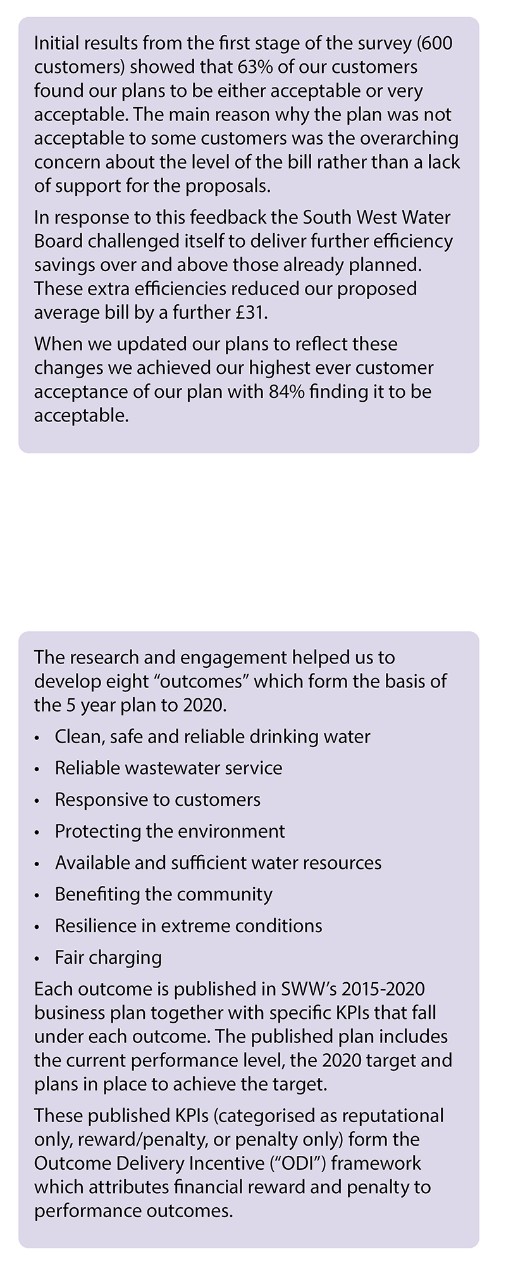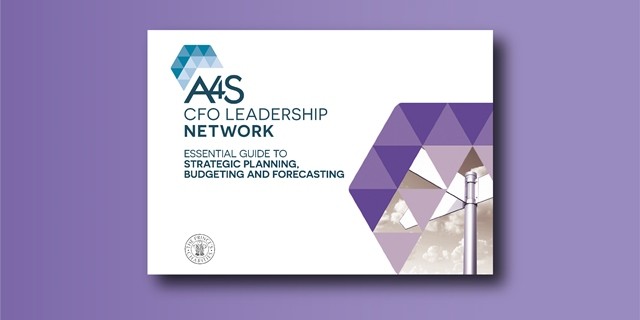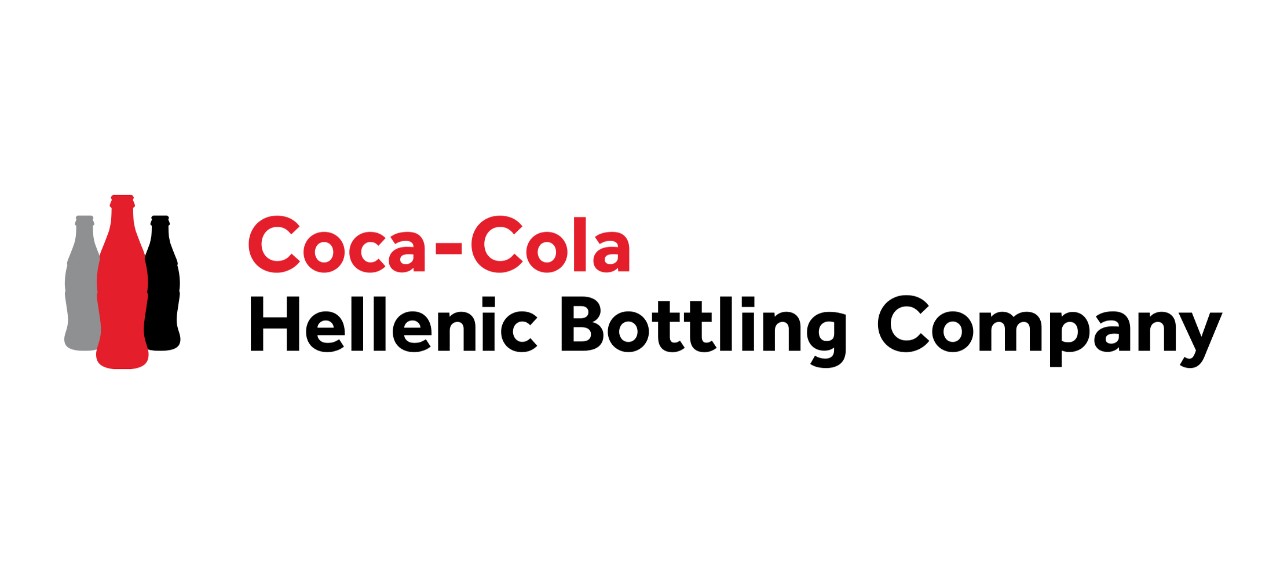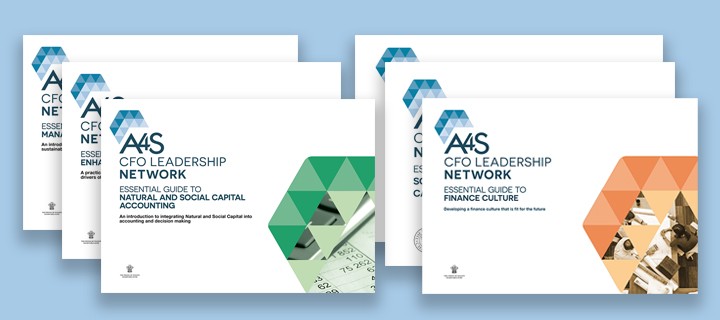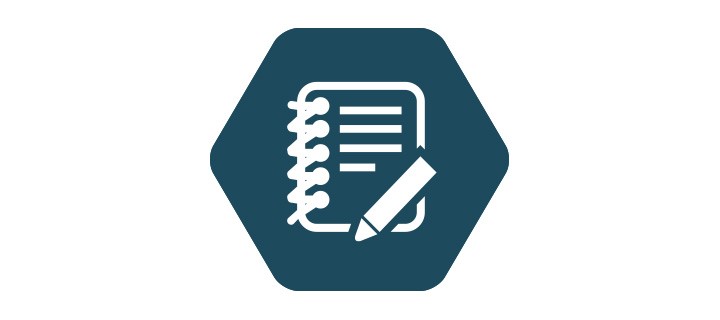South West Water: Strategic, Planning Budgeting and Forecasting
South West Water: integrating sustainability throughout strategic planning, budgeting and forecasting processes
BACKGROUND
For South West Water, sustainability is a common thread through long term strategic planning, to five year business planning and annual budgeting.
We have made sustainability commitments at Board level, as well as publicly, through our published 25 year vision. These commitments ensure that sustainability remains a key priority through planning and delivery.
Key actions within this have been:
- Integrating sustainability into our 25 year vision
- Including key sustainability outcomes linked to specific KPIs as part of our five year business plan
- Linking delivery of sustainability objectives into the governance and drive of overall business performance
- Reporting performance against committed performance levels
- Publishing the 25 year vision, commitments and performance on our website, to be transparent with stakeholders
- Develop guidelines for opex and capex budgeting processes that include short and long term sustainability factors
- Convert the strategic plan and high level initiatives into annual activities and milestones. Allocate accountable owners
- Deliver detailed ‘top down and bottom up’ annual operational and financial plans
25 YEAR VISION
In December 2012 we published our 25 year vision, “Waterfuture – What’s in the pipeline 2015 – 2040”. It outlined our long term objectives and was informed by extensive research carried out to determine our customers’ and stakeholders’ priorities for the future of water and wastewater services in our region.
Our approach to customer engagement covered two key areas:
• Understanding customers’ priorities
• Presenting options and allowing customers to choose
Understanding customer priorities
Our customer research and engagement work for the 25 year vision included customer and stakeholder focus groups to understand priorities around our region, willingness to pay surveys with over 1,200 household and 600 non household customers, and the launch of a dedicated website with our first in the industry online investment ‘e-tool’.
The feedback we received helped us develop our 25 year ‘WaterFuture’ vision which outlined the key customer priorities for services during 2015 – 2040. This identified our key long term aims to deliver:
• reliable supplies of safe, clean drinking water that not only meet the highest water quality standards but also looks and tastes great;
• responsive, innovative and cost effective services that meet our customers’ needs;
• sustainable actions and initiatives that protect the environment; and
• resilient business decisions and investments that deliver the most value for our customers whilst keeping our costs and bills as low as possible.
Presenting options and allowing customers to choose
Our second round of research retested our customers’ and stakeholders’ priorities for investment and also asked for their feedback on the timing and scale of those investments.
A range of potential impacts on the average household customer bill for 2019/20 were presented. This gave a range of average bill values depending on the timing of initiatives and investments.
Our final phase of research and engagement was to confirm that the refined proposals from our customer consultation delivered an economic level of service whilst being affordable and acceptable.
The challenge was to find the business plan which balanced the needs of all customers and stakeholders.
Initial results from the first stage of the survey (600 customers) showed that 63% of our customers found our plans to be either acceptable or very acceptable. The main reason why the plan was not acceptable to some customers was the overarching concern about the level of the bill rather than a lack of support for the proposals.
In response to this feedback, the South West Water Board challenged itself to deliver further efficiency savings over and above those already planned. These extra efficiencies reduced our proposed average bill by a further £31.
When we updated our plans to reflect these changes we achieved our highest ever customer acceptance of our plan with 84% finding it to be acceptable.
FIVE YEAR BUSINESS PLAN
The five year business plan to 2020 continued the sustainability thread but developed more specific and detailed sustainability commitments to develop five year priorities following extensive consultation with customers and stakeholders.
This was our largest ever consultation and throughout this process our activities have been robustly challenged and refined with the input of the independent WaterFuture Customer Panel and our Board of Directors.
BUDGETING AND FORECASTING
The sustainability priorities identified by customers and stakeholders are embedded into performance expectations for the five year business plan through the published Outcome Delivery Incentives (ODI) framework. For internal planning and driving delivery these are further divided into annual performance targets. Annual performance targets are set (in the form of ODI targets), as well as capital investment and cost efficiency targets.
Detailed budgets and delivery plans are prepared by each function based on their targets, and presented to the executive team. An ODI board, made up of members of the executive and senior management team, approves ODI delivery strategies as well as tracking delivery against target. This ensures all ODI performance is driven through the same framework, and links delivery of sustainability objectives into the governance and drive of overall business performance. Performance against ODI targets is reported monthly through internal management reporting and Board reporting.
The research and engagement helped us to develop eight “outcomes” which form the basis of the five year plan to 2020:
• Clean, safe and reliable drinking water
• Reliable wastewater service
• Responsive to customers
• Protecting the environment
• Available and sufficient water resources
• Benefiting the community
• Resilience in extreme conditions
• Fair charging
Each outcome is published in South West Water’s 2015 – 2020 business plan together with specific KPIs that fall under each outcome. The published plan includes the current performance level, the 2020 target and plans in place to achieve the target.
These published KPIs (categorized as reputational only, reward/penalty, or penalty only) form the ODI framework which attributes financial reward and penalty to performance outcomes.
“Through identifying long term sustainable outcomes with stakeholders, it was much easier to align short term targets and incorporate these into budgeting and forecasting processes.”
Susan Davy, Chief Financial Officer, Pennon Group (South West Water)
